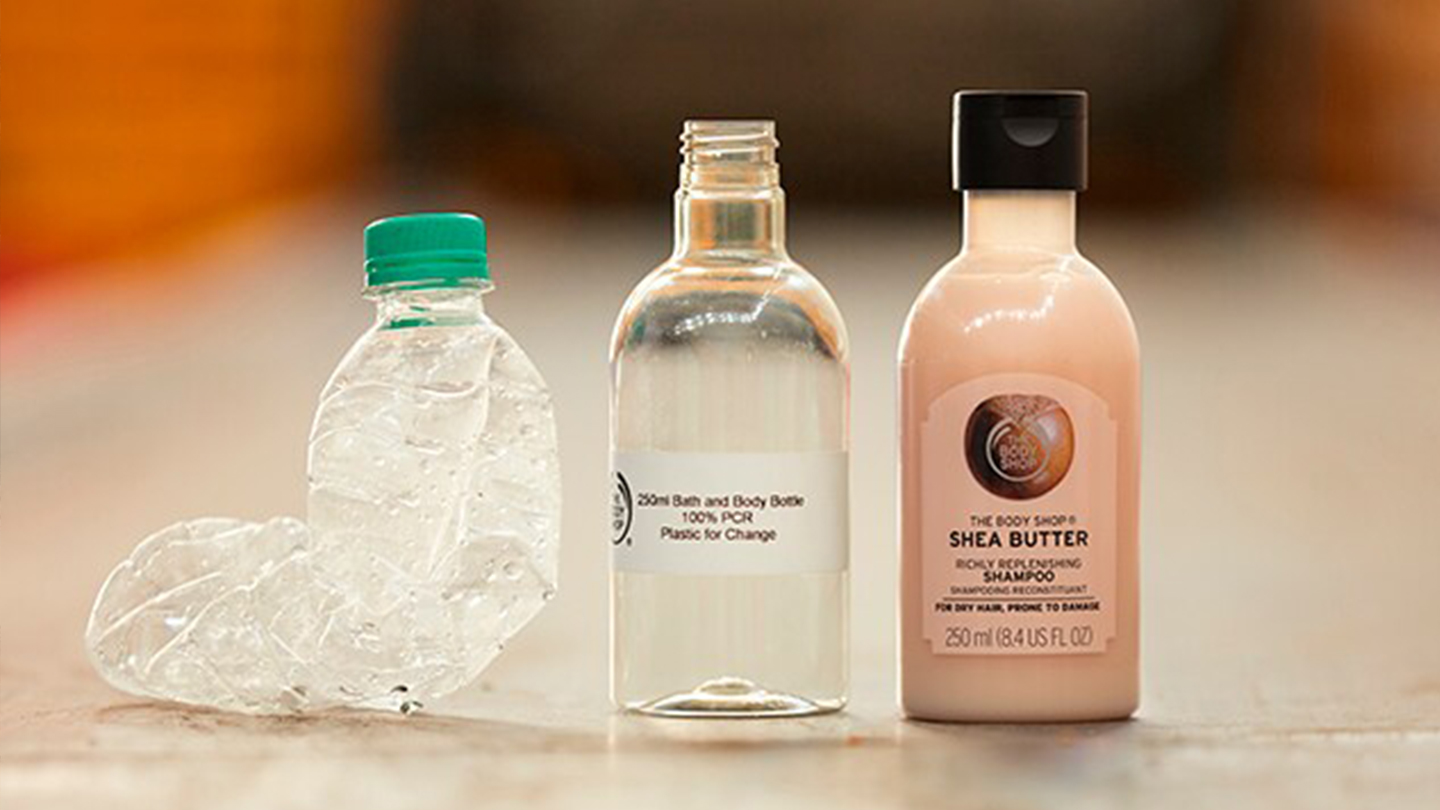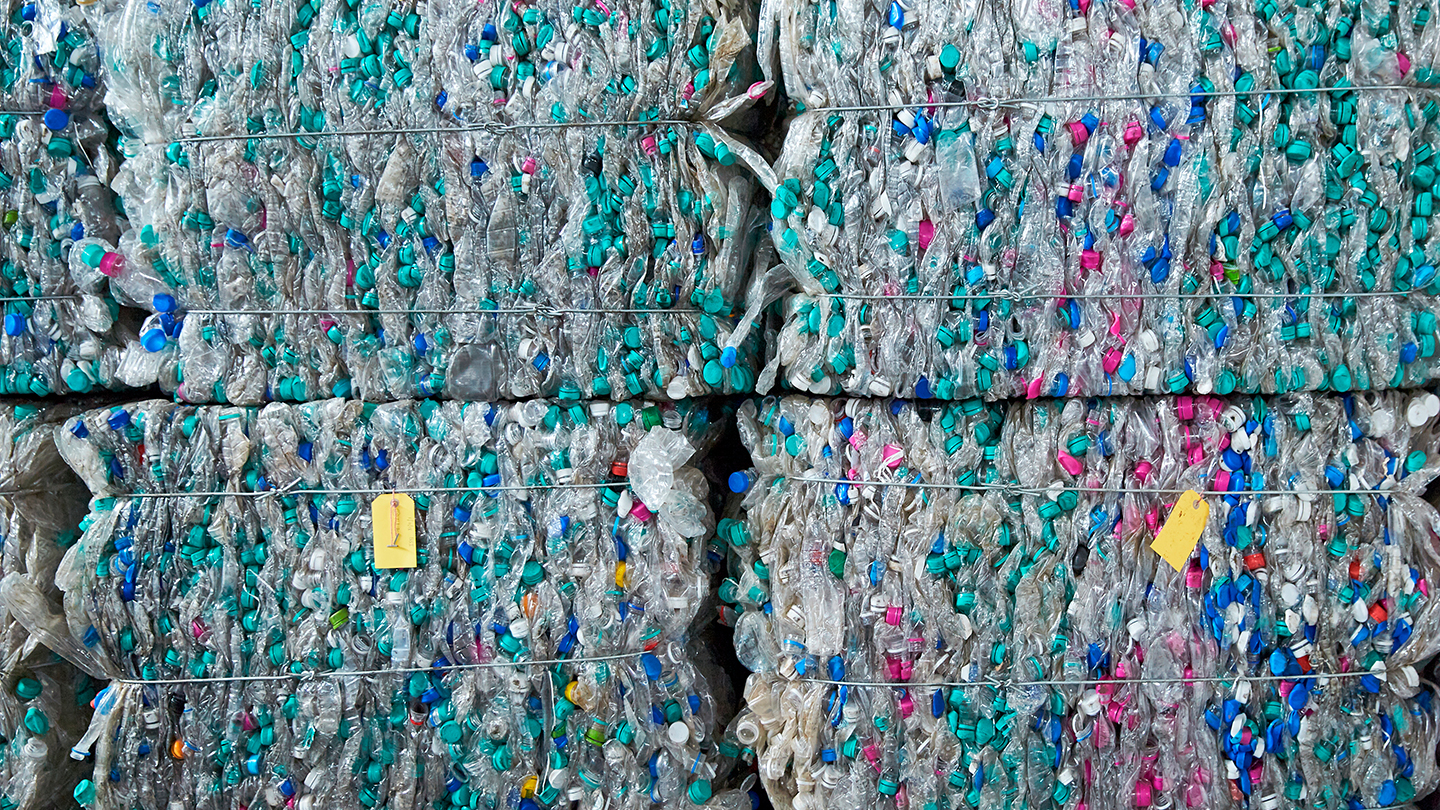You’ll have heard all the stats before: 13 billion plastic bottles are sold every year in the UK. Less than a fifth of all the world’s plastic is recycled globally. Every day, approximately 8 million pieces of plastic pollution find their way into our oceans. The world is basically drowning in plastic and, facing a burgeoning worldwide backlash, beauty brands especially are being forced to clean up their act. Some have gone packaging-less, others have swapped in biodegradable materials and some have begun to offer refill schemes. The general message? Plastic is cancelled.
Call them controversial, but The Body Shop begs to differ. “Plastic isn’t necessarily the problem,” says Lee Mann, the brand’s Global Trade Manager. “There is already so much plastic in the world, we just have to find ways to use this existing plastic in a more efficient way.” That’s why, like a handful of other beauty companies, The Body Shop has decided to start swapping its regular plastic bottles for recycled ones.
However, it isn’t — or at least shouldn’t be — as simple as buying a load of waste plastic and melting it down into new bottles. With recycled plastic en vogue, there’s a growing demand for new sources, which means many brands look abroad to collect their waste plastic. One key destination is India, where the growing waste collection industry is subject to an exploitative and volatile supply chain.
Over 90% of the recycling in India is informal, carried out by citizens known as waste pickers who collect dry waste from the streets. But despite providing the vast proportion of the country’s waste management services which the national and local Government has come to rely on, these waste pickers are often treated as non-citizens, refused the kind of identification required to access healthcare services. They can also face harassment from the police, and being self-employed, they have little to no protection against the changing economy.
In Bengaluru at least, things are getting better, thanks to the work of Hasiru Dala, a local trust dedicated to improving the rights of waste workers. “We believe that social protection and security are important to both the waste pickers and their families, and that livelihood and social protection are two sides of the same coin,” explains co-founder Nalini Shakar. “You can give any amount of money, but if there is no social security, the amount of money earned may not be enough to live off.” So far, the company has worked with the Government to ensure the recognition of waste pickers as vital contributors to society by securing them Government-issue ID cards, social security numbers as well as access to healthcare and finance skills training. All pretty vital stuff.
Partnering with this organisation, The Body Shop has launched the Community Trade Recycled Plastic programme, pledging to purchase plastic from the Bengaluru-based waste pickers and provide extra funding to continue the social work happening out there too. Even more promising still is the work of a third partner, Plastics for Change, who have created an app that not only helps to connect collectors to international buyers, but allows everyone to track the waste plastic through every step of the supply chain, offering full traceability. The brand also hopes to steady the supply chain by offering the waste pickers a fair and consistent price amid a fluctuating plastic market, and by placing regular orders, it will likely in turn create jobs for new waste pickers, sorters, drivers and centre managers.
As you can imagine, to rehouse the entire product range is going to take some time, so to start with it will just be its 250ml haircare bottles that will be made from this recycled plastic. Another key detail is that 15% of the plastic in the bottles will come from the waste pickers in India, while the rest will be made of recycled domestic plastic from across Europe. “Right now, there just isn’t the infrastructure within the collection and segregation centres to fulfil our full plastic requirements, but we’re working towards that,” adds Lee. This year, they plan to purchase 250 tonnes of this Community Trade recycled plastic, doubling to 500 tonnes in 2020 and extending its use to the wider product range.

Of course, we can’t gloss over the fact that even recycled plastic isn’t without its problems. Sceptics argue that celebrating large scale recycling schemes might encourage more plastic consumption, as individual guilt feels mitigated by the promise of recycling. And there’s also the not-so-small issue that many types of plastic can only be recycled a limited number of times before completely degrading — an issue The Body Shop hopes to mitigate by eventually mixing the recycled plastic with a small amount of virgin bio-plastic to improve recycling potential. You’ll also find a Terracycle bin in each of its stores too, to drop off your empty product bottles, so The Body Shop can keep as much plastic in the recycling loop as possible.
What we surely can agree on, however, is that it’s far better to use the plastic already haunting the planet than making new stuff. And if we can help the people doing the leg work to keep it out of our seas, rivers and landfills in the process, then that’s even better still.


